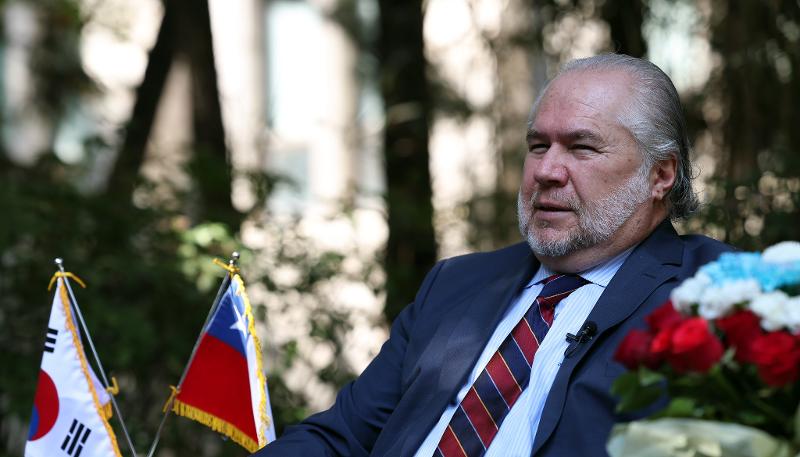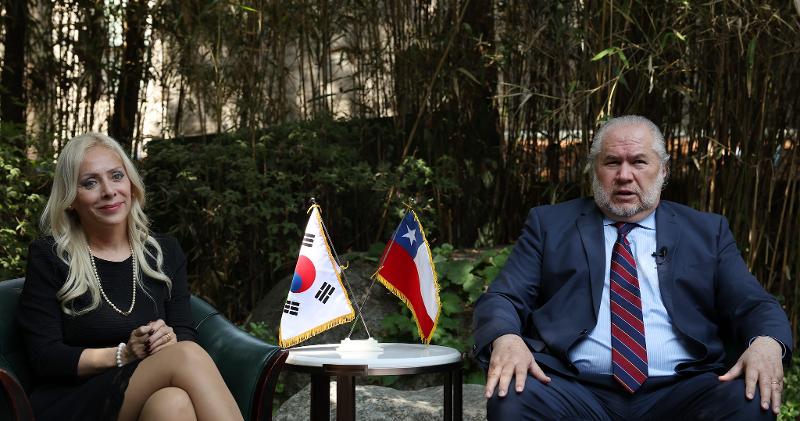| This year, Korea marks the 60th anniversary of diplomatic relations with 15 Latin American countries — Mexico, Argentina, Colombia, Chile, Ecuador, Guatemala, the Dominican Republic, Panama, Costa Rica, Paraguay, El Salvador, Honduras, Jamaica, Nicaragua and Haiti. In 1962, Korea began its path toward modernization through ties with just 27 countries, but in the same year, it forged formal relations with 15 of the 20 Latin American nations achieving independence at the time. Korea.net explores the direction of cooperation between Korea and its Latin American partners through interviews with ambassadors from the region. |

Gustavo Gonzalez, head of mission at the Chilean Embassy in Seoul, on May 24 said, “Both countries made history by signing the Korea-Chile free trade agreement (FTA) in 2004,” in an interview with Korea.net at the Millennium Hilton Seoul. “This was the first FTA between East and West.”
By Yoon Sojung and Kim Hayeon with contribution from Kim Yeonsue
Photos = Jeon Han
Video = Kim Sunjoo and Lee Jun Young
Seoul | May 24, 2022
Gustavo Gonzalez, head of mission at the Chilean Embassy in Seoul, has praised the Korea-Chile free trade agreement (FTA) signed in 2004, saying, “Both countries made history by signing the Korea-Chile free trade agreement.”
“This is the first FTA between East and West,” he said on May 24 in an interview with Korea.net at the Millennium Hilton Seoul in the capital’s Jung-gu District.
On assuming his post in Korea in November last year, Gonzalez said, “It feels like a second home to me.”
Having worked in Korea from 1993-95, he said he and his family traveled many places across the country like Seoraksan Mountain or Busan while living here. He said his children also retain fond memories of living in Korea when they were little.
A career diplomat, Gonzalez from 1996 to 2000 worked as third secretary at the Chilean Embassy in Honduras and second secretary in his country’s missions in Yugoslavia and Turkey. From 2006-09, he was first secretary and deputy head of mission in the Czech Republic and from 2011-20 deputy chief of mission in Romania and Denmark, general consul in Shanghai, China, deputy chief of mission in China and general consul in Paris.
He will make way for new Chilean Ambassador to Korea Mathias Francke, who arrived in Korea early this month and will present his credentials to President Yoon Suk Yeol later this month.
The following are excerpts from Korea.net’s interview with Gonzalez.
– Chile was the first country to conclude an FTA with Korea in 2004. What results has the agreement brought to both economies?
By signing the FTA, both countries made history because it was the first agreement of its kind reached between an Eastern country and a Western country.
For Chile, it also meant a lot since Korean technology companies that are known abroad could offer their products in our market at very affordable prices. Korean computers, mobiles and cars are used in Chile, helping ease our daily life thanks to these top-ranked technologies.
Chile is now updating the FTA, originally signed in 2004, to further widen bilateral trade, which exceeded USD 6.5 billion last year. This made Korea Chile’s fifth-biggest trading partner.
Thanks to the FTA, fresh Chilean fruits and vegetables are available on Korean families’ tables. Later, we will have the opportunity to see and taste Chilean products that can be found at many local markets (in Chile). Of course, Chilean wine is available everywhere in Korea as the most consumed wine (by nationality) in this country. You can get an even deeper taste of Chilean wine by pairing it with Chilean food. For this, I recommend tips from my wife Griselle Garin. For example, drink rose wine with salmon or fish. This sounds different from what we know about wine, but you’ll love it once you try it.
– This year marks the 60th anniversary of diplomatic relations between Chile and Korea. What cultural events does your embassy have scheduled for the occasion?
This year is very meaningful for both countries, so we’ve been planning a comprehensive agenda of activities to mark this diplomatic milestone.
Just to highlight a few events, we hosted in mid-April the first seminar on the future of bilateral relations attended by diplomats, academics and businesspeople. This event was co-hosted by the Ministry of Foreign Affairs of Korea, Korean Council on Latin America and the Caribbean, and Korea International Trade Association.
In the cultural arena, I can mention the donation to Korean libraries the complete works of Gabriela Mistral and Pablo Neruda, the two Chilean poets who received the Nobel Prize for Literature. In September, we will host an exhibition to mark the 500th year of the circumnavigation of the Strait of Magellan at the Korea National Library for Children and Young Adults in Seoul. And we are in the second stage of our digital initiative “Chilean Food Mondays,” which presents videos of Chilean recipes with Korean subtitles featuring Chilean women living in Seoul.
On June 15th, we hosted “Chile Day” at the Korea Herald Global Business Forum, which attracted 100 Korean CEOs. This was the perfect occasion to introduce the trade and investment opportunities that our country can offer.
Working with the other 12 Latin American embassies that also celebrate 60 years of bilateral relations with Korea, our embassy is organizing an interview for every (Latin American) ambassador based in Seoul.
– This year, Chilean President Gabriel Boric took office in March and President Yoon Suk Yeol in May. What sectors do the two new administrations emphasize cooperation in?
Our bilateral agenda is very comprehensive. Presidents Boric and Yoon will continue the path that we’ve developed during these first 60 years. Topics such as science and technology, renewable energy and climate change will remain as top priorities for us. We recently signed a memorandum of understanding (MOU) on green collaboration in hydrogen to prepare for the future of the energy sector, and take on the challenge of implementing the MOU we signed on cooperation in the Fourth Industrial Revolution a couple of years ago.
– If COVID-19 turns endemic, human exchanges will soon be revitalized. What do Chile and Korea plan to do in this sector?
Chile has eased requirements to enter the country thanks to a successful vaccination process. Consequently, we are reviving human exchanges. One of our major tasks is to boost tourism in Chile by receiving the most Korean visitors possible.
I must point out that even during the hardest time of the pandemic, neither the businesspeople nor government officials of Chile and Korea stopped traveling. Their duties were to promote trade, secure value chains, and continue projects that bring jobs and economic development. Thanks to that, we have smoothly started post-pandemic recovery.

“Korea feels like a second home to us,” Gustavo Gonzalez, head of mission at the Chilean Embassy in Seoul, and his wife Griselle Garin said on their second stay in Korea, which came almost 30 years after their first.
– How will both countries enhance cultural exchange at the civilian level?
Korean culture is a reality in Latin America. Young people are listening to Korean music, watching Korean dramas and even eating Korean food. It’s a good symbol of how intercultural understanding is developing a bottom-up dynamic and how diplomats should have that in mind. Chile is ranked 15th in the number of K-pop-related tweets and one of the top countries for K-pop streaming.
On the challenge of stimulating cultural exchanges, I want to underline that in April this year, Chile and Korea restarted applications for the working holiday visa. This is originally based on an agreement signed in 2015 allowing youth of one country to visit the other on a one-year visa. This is a good example of a diplomatic tool helping hundreds of young people to experiment with multiculturalism.
Also, the exchange of university students by both countries is increasing every year. We hope to receive more Korean students in our country to learn Spanish and that more Chileans study at research institutes in Korea in fields like science and technology.
– This is your second tour of duty in Korea. What is the most remarkable change you’ve seen in the nation since you were last here?
My family lived in Korea like it was our second home. My children also have wonderful memories here when they were young and still remember the dried seafood or beverages they sampled at traditional markets in Seoul. We traveled many places across the country, including Seoraksan Mountain and Busan.
I loved Korean dishes like seolleongtang (beef soup), galbi (grilled beef ribs) and bulgogi (marinated grilled beef) and enjoyed soju (traditional liquor) or beer. Over the last 30 years, Korea has achieved a lot of development, all good. We can see many skyscrapers here and the country is very much modernized. Also, Koreans are always kind to foreigners. I’m happy to be here again.
arete@korea.kr







![[K-brand-promoting ethnic Koreans ⑤] Spreading taekwondo ‘spirit’ in Singapore](https://gangnam.com/file/2024/02/20231129124433000_ENU3D0FB-218x150.png)















